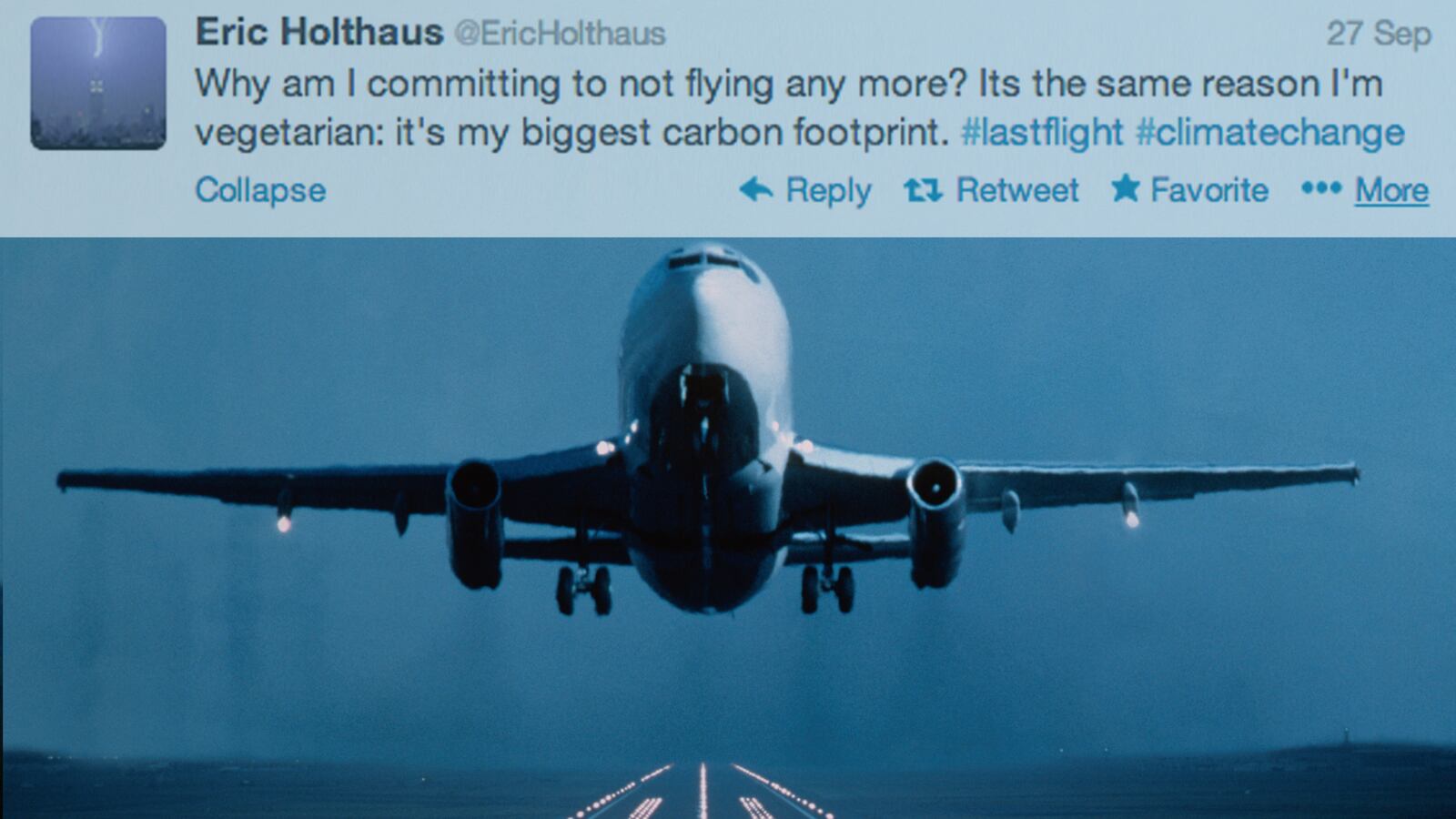Eric Holthaus was sitting in his hotel room in San Francisco at 5 o’clock in the morning, finishing up a story about a new report out from the Intergovernmental Panel on Climate Change, which declared the planet to be warming at an even more alarming rate than originally believed. The report noted that the last 30 years were the warmest in the last 1,400 years and concluded, “It is extremely likely that human influence has been the dominant cause of the observed warming since the mid-20th century.”

Holthaus called his wife in Wisconsin and, after telling her about the report’s findings, said, “I don’t know what to do anymore.”
He got a plane to fly home and began live-tweeting his answer: forswearing airplane travel, forever.
“I just broke down in tears in boarding area at SFO while on my phone with my wife,” Holthaus tweeted. “I never cried because of a science report before...I realized, just now: This has to be the last flight I ever take. I’m committing right now to stop flying. It’s not worth the climate...We have to do everything we can, every day to reverse CO2 emissions. There is no other way that makes sense.”
The lifestyle change won’t come easy. Holthaus, 32, is a meteorologist by training who developed something of a cult following when he live-tweeted Hurricane Sandy for 10 days while working as a contributor to The Wall Street Journal. He is now writing for Quartz and working on Weathermob, an app that uses cellphones to collect and distribute more accurate weather data. He has traveled to Ethiopia several times over the last couple of years to work on a climate change project there, and in the last year he vacationed in Colorado, Michigan, and Tanzania.
“I don’t think this is that strange of a thing,” he tells The Daily Beast of his decision to give up flying. “I am used to working in Africa, where most people don’t even dream of driving a car, let alone owning a car, let alone traveling to the U.S., so from a global perspective it is a very privileged thing. We in the U.S. take for granted that we can fly anywhere, any time we want.”
Holthaus’s declaration of transportation independence put him on the side of a growing number of environmental activists who have warned against the evils of air travel. As far back as 2006, the English writer George Monbiot posted a piece on his blog under the headline “We Are All Killers,” writing that increased air travel was “an utter, unparalleled disaster.” The group Aviation Justice reported in 2009 that flying is responsible for 5 percent of climate change impacts and has said Prius-like changes in efficiency are unlikely.
Members of the anti-flying movement were thrilled by Holthaus’s sudden declaration and the attendant publicity it generated.
“If he was going to make any kind of change after the report came out, this seems like the one to do,” said Chris Shaw, a environmental researcher at the University of Oxford. Shaw said he has flown only once in 10 years, for a family vacation to Spain, and has never met his nephew, who lives in Thailand with Shaw’s brother. Ten years ago, he said, “I thought, well, if lots of people say, ‘We are not going to fly,’ that would be a clear to message to policy makers. But obviously, lots of people didn’t.”
Holthaus said he thought he was pretty good on the environmental front. He does not own a car, does not eat meat, takes recycled bags to the grocery store. But when he plugged his stats into a carbon calculator online, he found that thanks to his air travel, he had double the emissions of the average American, putting him most likely in the upper echelon of polluters around the globe.
“I write about climate change. This is a huge problem. Everyone needs to pay attention, and I am not practicing what I preach,” he said. “This is it. I have to do something, or how can I expect anyone else to do anything?”
Vacations will have to be taken closer to home, he said. Skype will replace conferences. When possible, he will take the train. He mused aloud on Twitter about getting a vasectomy but stressed that he and his wife have made no decision.
If everyone quits flying, Holthaus knows it will mean a vastly different world than the one we have come to know, he said.
“Cutting back on fossil fuels will require remaking our world economy,” he said. “I know that. But it’s obvious government is not willing to reduce emissions, and we are approaching the point where nothing can be done to reverse climate change.”
Cutting out flying will, Holthaus said, reduce his own carbon output by half. He doesn’t necessarily expect others to follow suit, but if Americans took even one less long-haul vacation a year and stayed local, they would go a long way toward cutting down on emissions.
“It’s a little bit of the opting out, back to the land movement—slow food, organic, all that stuff—but at the same time it requires sacrifice,” he said. “It is not something that is going to be appealing to the average person. People want to have their same lifestyle with less impact. What I am saying is that is not possible.”






